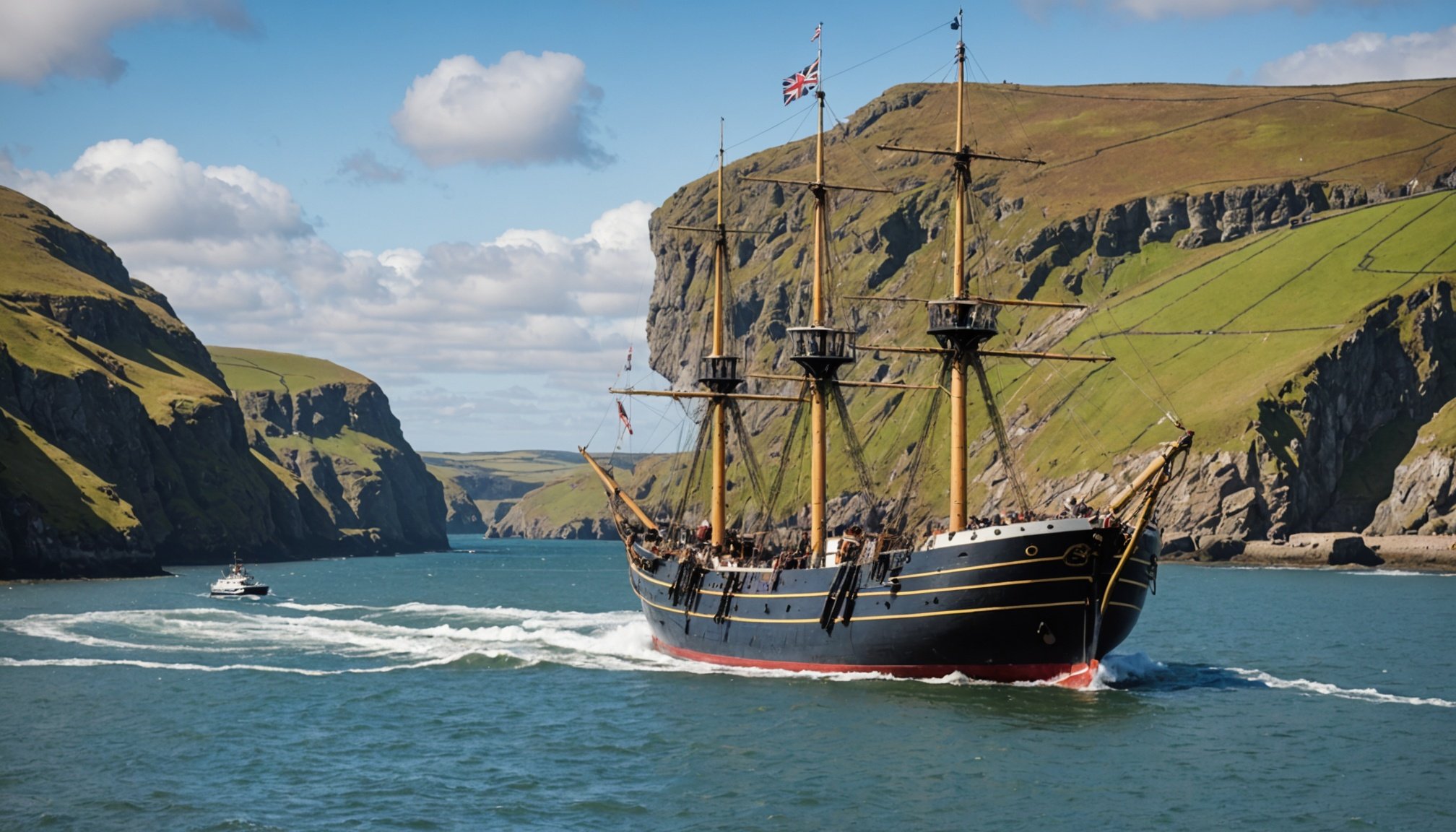Introduction to British Maritime Navigation Heritage
British maritime history is a vibrant tapestry of exploration and innovation, playing a pivotal role on the global stage. Britain’s legacy in maritime navigation is vast, underscoring its profound cultural significance. This navigation heritage is reflected through numerous English destinations that have been integral to maritime advancement. Sites across England offer a unique glimpse into this history, from bustling ports to solemn shipyards, each telling its own story.
Understanding Britain’s maritime past is not just about ships and voyages; it’s an exploration of the nation’s soul. The significance of guided tours in experiencing this rich heritage cannot be overstated. These tours provide a structured yet engaging way to immerse oneself in British maritime history. They often feature in-depth narratives about local heroes and events that shaped the nation’s path on the seas.
In the same genre : Explore britain”s hidden cold war secrets: the ultimate guided tours of espionage mysteries
British maritime navigation heritage is an invitation to walk through history, with English destinations serving as living museums. Whether through hands-on exhibits or guided strolls along historic docks, one can fully appreciate Britain’s role in weaving the fabric of maritime exploration globally. Discover the allure and significance of this cultural legacy with meticulously crafted tours that delve deeper into the past.
Recommended English Destinations for Maritime Tours
When exploring English maritime destinations, some coastal towns stand out for their rich maritime history and offer immersive guided tours. These tours cater to both history enthusiasts and casual travelers, ensuring an engaging experience for all.
In the same genre : Explore the best uk destinations for immersive guided tours on british aviation history
Plymouth, a historical site, is noted for its iconic Mayflower Steps. This is where the Pilgrims set sail for America in 1620. Plymouth also offers guided tours that delve into its naval past and famous voyages. The city’s blend of history and vibrant culture makes it a great starting point for maritime exploration.
Portsmouth is a must-visit for those interested in naval warfare history. The Historic Dockyard is home to the HMS Victory, Lord Nelson’s flagship. Portsmouth’s rich tapestry of maritime stories can be explored through detailed tours of naval museums and active shipbuilding traditions.
Whitby engages travelers with tales of Captain Cook, who started his maritime career here. The coastal town offers insights into his journeys and the whaling industry’s history. Whitby provides a picturesque setting to explore these narratives.
Each of these destinations is well-equipped for visitors, offering convenient access via public transport and packed with accommodating amenities to enhance your travel experience.
Tour Operators Offering Immersive Experiences
Exploring British maritime heritage is best experienced through guided tours designed by reputable maritime tour operators. These specialized companies offer a range of experiences that cater not only to maritime enthusiasts but to any traveler intrigued by history and culture. Among the notable operators are British Heritage Travel and Maritime Voyages, known for their attention to historical accuracy and engaging narratives.
Types of tours vary widely, from day trips examining historical vessels to extended journeys following the paths of famous explorers. For instance, some tours focus on the art of shipbuilding, offering interactive workshops. Guided tours often include knowledgeable guides who infuse stories of local legends and historical facts, bringing the past to life in an engaging manner.
Traveler testimonials frequently highlight the personalized attention and detailed narration offered by these tour operators. User ratings favourably mention the once-in-a-lifetime immersion into Britain’s rich maritime legacy, praising the tours for their well-planned itineraries and the seamless blend of education with entertainment. Selecting a tour with such operators guarantees an experience brimming with insight, truly enhancing one’s understanding and appreciation of Britain’s maritime contributions.
Historical Significance of British Maritime Navigation
The exploration and dominance of the seas have an indelible mark on British naval history, symbolising an era of maritime navigation power and a pillar of Britain’s global influence. In earlier centuries, the development of advanced navigation techniques played a crucial role. The astrolabe and later the sextant transformed naval expeditions. These instruments allowed sailors to determine their latitude at sea, enabling safer and more accurate long-distance travel.
Several key historical figures emerge from British naval history. Explorers like Sir Francis Drake, who was the first Englishman to circumnavigate the globe, significantly contributed to the nation’s maritime prestige. His victories against the daunting Spanish Armada showcased the strategic maritime might of England.
Major maritime events also deeply influenced Britain’s navigation heritage. For example, the establishment of the Royal Navy in the 16th century as a dominant sea force reshaped international maritime dynamics. The Battle of Trafalgar in 1805 underscored the pivotal role of naval strategies, solidifying Britain’s supremacy at sea.
These elements together highlight the cultural and technological advancements integral to Britain’s maritime navigation legacy, showcasing the importance of the seas in shaping history and cultural identity.
Engaging Narratives About the Locations
Enhancing the allure of maritime destinations across England are captivating narratives steeped in history and myth. Each locale boasts unique maritime folklore, providing a rich tapestry of stories that deepen visitors’ appreciation. In Plymouth, legends recount the Pilgrims’ voyage, enriching the experience of viewing the Mayflower Steps. These tales help contextualize the departure’s historical significance for both England and America.
In Whitby, stories of Captain Cook’s early endeavors breathe life into its scenic harbors. Locals and guides share personal stories, blending historical facts with lore, bringing vibrant dimensions to Cook’s voyages. Meanwhile, in Portsmouth, naval tales of the HMS Victory’s triumphant role at Trafalgar captivate visitors. Such narratives combine military precision with heroism, commemorating British naval strength.
These stories, often narrated by knowledgeable guides, create a vivid tableau that enhances the travel experience. By understanding these cultural narratives, visitors engage in a deeper connection with England’s maritime past. It is the blend of historical facts and compelling storytelling that transforms these tours into memorable, enlightening journeys, bridging the gap between past and present for an altogether immersive experience.
Practical Information for Travelers
Embarking on a journey through Britain’s maritime navigation heritage requires careful planning. Understanding tour details is crucial for a seamless experience. Tours are often available in multiple formats: full-day excursions, half-day explorations, and specialized workshops. Each option provides a tailored approach to engaging with maritime history.
When considering pricing information, variations exist depending on the depth and length of the tour. While shorter tours may provide a brief overview, longer experiences delve deeper, offering more comprehensive insights. Advanced bookings can often lead to favorable discounts and ensure availability, particularly during peak tourist seasons.
Travelers should take note of practical tips to enhance their visit. Opting for public transport is often recommended due to the proximity of popular destinations to local transit hubs, thus minimizing environmental impact. Comfortable attire is advocated, along with weather-appropriate gear as many tours involve outdoor exploration.
Finally, adhere to safety guidelines provided by tour operators. Ensuring adequate hydration, carrying sunscreen, or an umbrella, and staying with group leaders are basic yet important preparations. By considering these aspects, visitors can fully immerse themselves in the captivating stories and rich history of Britain’s nautical past.
Testimonials and Experiences from Travelers
Delving into the experiences of those who’ve embarked on maritime tours, one finds a tapestry of engaging stories. Traveler experiences often speak to the unique allure of guided tours, offering firsthand insights into the significant cultural impact these excursions impart.
According to various reviews, one central theme is the blend of historical richness and modern storytelling that captivates visitors. Many travelers cherish the opportunity to absorb maritime narratives through the personal anecdotes shared by guides. This interplay of facts and stories creates a vivid image of maritime Britain’s past, fostering deeper connections to each location.
Numerous travelers highlight the memorable moments encountered on tours, such as stepping aboard historic ships and witnessing interactive demonstrations. These hands-on experiences allow for a tangible connection to history, bridging the gap between past and present.
Personal feedback frequently emphasizes how such experiences foster a newfound appreciation for destinations. Engendering empathy and understanding, maritime tours transform history from abstract dates and events into compelling tales of courage and discovery. Through these guided adventures, travelers report a profound appreciation for the enduring legacy of British maritime navigation.











